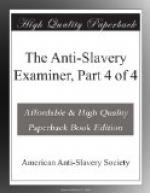[Footnote 20: In Carlyle’s Review of the Memoirs of Mirabeau, we have the following anecdote illustrative of the character of a “grandmother” of the Count. “Fancy the dame Mirabeau sailing stately towards the church font; another dame striking in to take precedence of her; the dame Mirabeau despatching this latter with a box on the ear, and these words, ’Here, as in the army, THE BAGGAGE goes last!’” Let those who justify the negro-pew arrangement, throw a stone at this proud woman—if they dare.]
Nor are we permitted to confine this principle to religious assemblies. It is to pervade social life everywhere. Even where plenty, intelligence and refinement, diffuse their brightest rays, the poor are to be welcomed with especial favor. “Then said he to him that bade him, when thou makest a dinner or a supper, call not thy friends, nor thy brethren, neither thy kinsmen, nor thy rich neighbors, lest they also bid thee again, and a recompense be made thee. But when thou makest a feast, call the poor and the maimed, the lame and the blind, and thou shalt be blessed; for they cannot recompense thee, but thou shalt be recompensed at the resurrection of the just.”
In the high places of social life then—in the parlor, the drawing-room, the saloon—special reference should be had, in every arrangement, to the comfort and improvement of those who are least able to provide for the cheapest rites of hospitality. For these, ample accommodations must be made, whatever may become of our kinsmen and rich neighbors. And for this good reason, that while such occasions signify little to the latter, to the former they are pregnant with good—raising their drooping spirits, cheering their desponding hearts, inspiring them with life, and hope, and joy. The rich and the poor thus meeting joyfully together, cannot but mutually contribute to each other’s benefit; the rich will be led to moderation, sobriety, and circumspection, and the poor to industry, providence, and contentment. The recompense must be great and sure.
A most beautiful and instructive commentary on the text in which these things are taught, the Savior furnished in his own conduct. He freely mingled with those who were reduced to the very bottom of society. At the tables of the outcasts of society he did not hesitate to be a cheerful guest, surrounded by publicans and sinners. And when flouted and reproached by smooth and lofty ecclesiastics, as an ultraist and leveler, he explained and justified himself by observing, that he had only done what his office demanded. It was his to seek the lost, to heal the sick, to pity the wretched;—in a word, to bestow just such benefits as the various necessities of mankind made appropriate and welcome. In his great heart, there was room enough for those who had been excluded from the sympathy of little souls. In its spirit and design, the gospel overlooked none—least of all, the outcasts of a selfish world.




